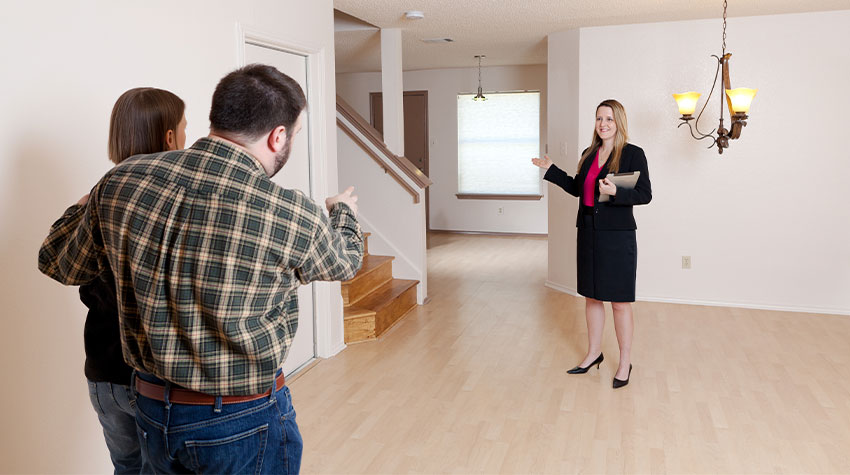Make a list – check it twice. Viewing homes is exciting, exhausting and – after enough of them – confusing. By the end of the day, your memory may become fuzzy and you may lose track of what you're really looking for... or what you SHOULD be looking for. That's why we developed this comprehensive list of 8 things to consider when buying home.
Home with a view
Homes with a pleasant view of the horizon often sell at a premium above similar homes without the view. However, if a view is important to you, buy it mostly for your own pleasure and not as an investment. Though you may place a considerable dollar value on the view, future buyers may not be so like-minded. It may take you longer to find a buyer when it comes time to resell the house. Or you may end up dropping your price to more nearly match other sales prices in the neighborhood.
In short, if you are buying a house with a view, try to pay as little extra as possible. Otherwise, you might not get your money back.
Lot and landscaping
Even though most real estate value is usually concentrated in the building, the lot is important, too. Obviously, it should be as level as possible. Assuming the property is in a typical neighborhood, the lot should be rectangular – no odd shaped lots or oddly situated lots.
Yard sizes are smaller in modern homes than in older homes, but there should still be a decently sized front and back yard. Do not buy a house where the entire back yard is taken up by a swimming pool, for example.
Do not purchase an over-landscaped property, either. You would normally pay a premium for that, which you may not be able to recover when you sell. You will get your best value if the house is moderately landscaped or under-landscaped for the area. You can always improve the landscaping during your ownership by improving the grass and adding bushes and trees. Just do not spend too much.
House size
In each residential neighborhood, houses will vary in size and rooms, but they should not be too different. If resale value is an important consideration, you should not buy the largest model in the neighborhood. When determining market value, the homes nearest to yours are most important. If most of the nearby houses are smaller than your house, they can act as a drag on appreciation.
On the other hand, if you buy a small or medium house for the neighborhood, the larger homes can help pull up your value. This is one of those times where determining your "wants" versus your "needs" can be extremely important. Buying what you need in a more prestigious neighborhood may provide more financial reward than getting what you want in a less desirable neighborhood.
Bedrooms and bathrooms
Three and four bedroom houses are the most popular among homebuyers, so if you can stick in that range you will have more potential buyers when it comes time to resell. Five is okay, too, as long as you do not have to pay too much extra for the additional bedroom.
There should always be at least two bathrooms in a house, preferably at least two and a half. One bathroom with a place to wash up for day-to-day visitors, one for the master bedroom, and at least one to be shared by the other bedrooms.
The all important kitchen
Family activity centers around the kitchen, so this is the most important room of the house. Larger kitchens are better, and they should be provided with modern appliances. Obviously, the dining room and breakfast nook should be located adjacent to the kitchen. In newer houses, the family room should also be extremely close to the kitchen.
There should be easy access to the back yard, as there will be occasions for barbecues and outdoor entertaining. In addition, it should be a short trek between the garage to the kitchen so hauling groceries in from the car does not become a horrendous chore.
Closets, garages, and laundry
Walk-in closets are extremely desirable for the master bedroom. For the rest of the house, just be sure there is plenty of closet space. Don't forget space for linens and towels.
Garages add to the resale value and you should always make sure to get at least a two-car garage. Lately, three-car garages have become desirable in some areas of the country.
The laundry facilities should be located somewhere convenient on the main floor of the house, but not in a place it will create an eyesore. Think about whether you want to walk up and down stairs when carrying loads of laundry.
Fireplaces
The only room where you absolutely have to have a fireplace is the family room. A fireplace in the living room may be nice, but you pay extra for it and will probably rarely use it. At best, it serves as a focal point of the living room, but does not add much in real value.
Swimming pools
Swimming pools do not provide as much added value as they once did. Safety issues about families with younger children have become more publicized than in the past, so families with small children tend to avoid homes with pools. As a result, having a pool may actually reduce the number of potential homebuyers when you try to resell the home.
Buy a home with a pool for your own enjoyment, not as an investment.
Since we are on the subject of swimming pools, here is a word of advice: If you want a pool, buy a home that already has a pool. Paying a contractor to install one for you is like throwing money away. You will never get a dollar-for-dollar return on your investment.

